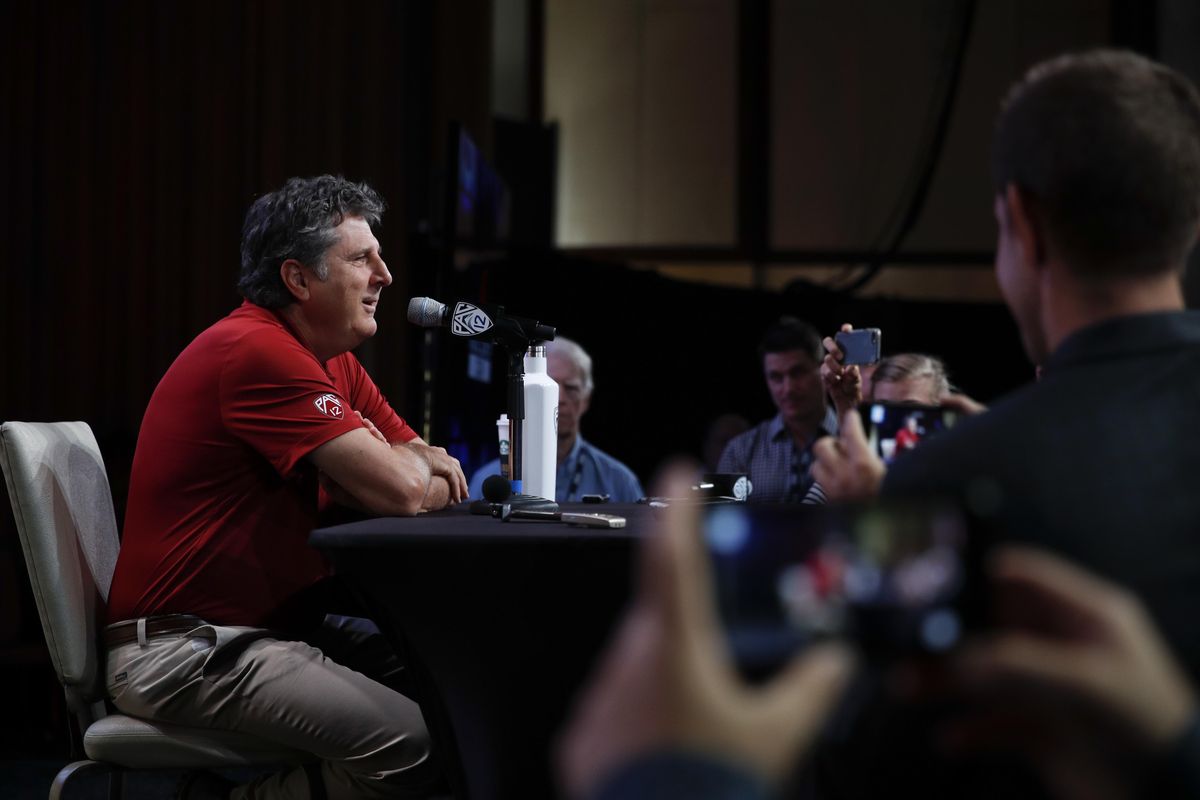Tyler Hilinski tragedy a main point of conversation during Pac-12 media gathering

HOLLYWOOD, Calif. – It loomed large Wednesday, as many thought it would.
UCLA coach Chip Kelly wore a rubber bracelet printed with the “Hilinski’s Hope” slogan.
Mike Leach fielded six questions about the quarterback who was supposed to lead his Cougars into 2018 – and probably a few more when he stepped away the podium at Hollywood & Highland.
Wide receiver Kyle Sweet was pressed by reporters to reflect on the legacy of his teammate and friend.
And the conference’s commissioner dedicated a segment of his introductory speech to disclose the league’s efforts regarding mental health awareness and CTE prevention. Surely, the timing of this particular address wasn’t accidental.
“It tells us that we have to make this a priority,” Larry Scott said. “And that’s what we’re doing with experts on our campuses.”
Leach’s interview at Pac-12 Media Day didn’t strike the same comedic tone it typically does at the Hollywood-based gathering – at least far less of one – and part of it can be attributed to the fact that one of the overarching themes was the tragic suicide of his quarterback, Tyler Hilinski, a rising junior and SoCal native who’d be a considered a local out here in the outskirts of Los Angeles.
How do you prepare and advise your team dealing with Tyler’s death and how did you handle that?
Are those conversations of mental health bringing mental awareness for your team?
Has it made you more aware of things as you watched your team throughout the summer?
Leach responded eloquently to each of the questions directed to him about Hilinski – “we all have very fond memories of Tyler,” he said – but also assured that his quarterback wouldn’t want his coaches and teammates to linger on the topic, stating, “We’re proud that we had the opportunity to know him, but then also he would want us to – we believe, anyway, or I do, that he’d want us to move on and have productive lives and elevate we can do.”
As an ode to his teammate, Sweet, who represented the Cougars in Hollywood alongside safety Jalen Thompson, sported the same bracelet Kelly was wearing and two others that paid homage to Hilinski.
“When we were having a bad practice or something like that, bad day, he’d always be the one to get guys going again,” Sweet said. “… It seemed like he was always there the time we needed a pickup the most.”
WSU surrounded Cougars football players with counseling in the immediate wake of Hilinski’s death. Six months later, the quarterback’s teammates still believe it’s essential to continue the dialogue about mental health and depression.
“It’s a huge problem, not just around college football or sports, but the world. It’s a big deal,” Sweet said. “Going through it personally, firsthand, I think it’s incredibly important to get out there and understand you need to talk to someone if you’re going through something.”
Josh Woods, a UCLA linebacker who played with Hilinski at nearby Upland High, offered his own memories of his prep teammate.
“I’ll always remember Tyler as goofy, high energy, positive,” Woods said. “He was such a sweet guy – a guy you want on your team, a guy you want in your locker room.”
In response to Hilinski’s death, Woods said he made it a priority to encourage his Bruins teammates to seek help if they find themselves in a position where it’s needed. UCLA is one of the numerous schools that has offered Hilinski’s younger brother Ryan, a top-rated pocket passer in the class of 2019.
“Doctors and people have talked to us, but me personally, I stood up in front of the whole team and told them, ‘Tyler was my guy and if you ever need anything or want to have any talks, come talk to me and don’t be afraid,’ ” Woods said. “A lot of guys have the thought you can’t be soft, can’t have emotions … I tell them, ‘Never be afraid, be ashamed of what you have going on.’ ”
The Pac-12 has worked to raise awareness and funds for mental health – something the conference has accomplished through a 5-year-old program entitled the Pac-12 Student-Athlete Health and Well-Being Initiative. The conference pours $3.6 million annually into the program and this year awarded specific grants that will be used to address head trauma and mental health.
In June, an autopsy conducted by the Mayo Clinic revealed traces of CTE (Chronic Traumatic Encephalopathy) in Hilinski’s brain. It’s unknown if, or to what level, the disease contributed to the quarterback’s suicide.
But Pac-12 coaches acknowledge there’s still plenty to learn when it comes to head trauma, mental health and how the two are related.
“I just think the more we make players aware the safety of the game is critical, because it’s about the game, it’s about the protection of the players,” said Arizona State coach Herm Edwards. “And I think it has really taken – from the ’70s to right now, the era that I played in, it has advanced and helped the game tremendously.”